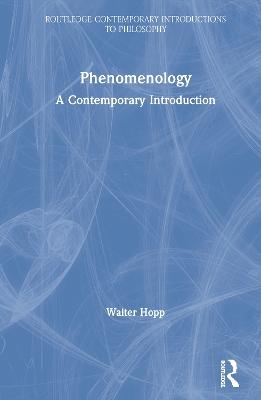
Phenomenology
A Contemporary Introduction
Seiten
2020
Routledge (Verlag)
978-0-367-49738-5 (ISBN)
Routledge (Verlag)
978-0-367-49738-5 (ISBN)
This book introduces students and other readers to several foundational topics of phenomenological inquiry, and to demonstrate phenomenology’s contemporary relevance.
The central task of phenomenology is to investigate the nature of consciousness and its relations to objects of various types. The present book introduces students and other readers to several foundational topics of phenomenological inquiry, and illustrates phenomenology’s contemporary relevance. The main topics include consciousness, intentionality, perception, meaning, and knowledge. The book also contains critical assessments of Edmund Husserl’s phenomenological method. It argues that knowledge is the most fundamental mode of consciousness, and that the central theses constitutive of Husserl’s "transcendental idealism" are compatible with metaphysical realism regarding the objects of thought, perception, and knowledge.
Helpful tools include introductions that help the reader segue from the previous chapter to the new one, chapter conclusions, and suggested reading lists of primary and some key secondary sources.
Key Features:
Elucidates and engages with contemporary work in analytic epistemology and philosophy of mind
Provides clear prose explanations of the necessary distinctions and arguments required for understanding the subject
Places knowledge at the center of phenomenological inquiry
The central task of phenomenology is to investigate the nature of consciousness and its relations to objects of various types. The present book introduces students and other readers to several foundational topics of phenomenological inquiry, and illustrates phenomenology’s contemporary relevance. The main topics include consciousness, intentionality, perception, meaning, and knowledge. The book also contains critical assessments of Edmund Husserl’s phenomenological method. It argues that knowledge is the most fundamental mode of consciousness, and that the central theses constitutive of Husserl’s "transcendental idealism" are compatible with metaphysical realism regarding the objects of thought, perception, and knowledge.
Helpful tools include introductions that help the reader segue from the previous chapter to the new one, chapter conclusions, and suggested reading lists of primary and some key secondary sources.
Key Features:
Elucidates and engages with contemporary work in analytic epistemology and philosophy of mind
Provides clear prose explanations of the necessary distinctions and arguments required for understanding the subject
Places knowledge at the center of phenomenological inquiry
Walter Hopp is Associate Professor of Philosophy at Boston University. He is the author of Perception and Knowledge: A Phenomenological Account (2011).
Preface
1. Consciousness
2. Consciousness—A Look Inside
3. Intentionality and Meaning
4. The Mental Act
5. Meaning and Intuition
6. Perception
7. The Essential Inadequacy of Perception
8. The Content of Perception
9. Knowledge
10. Phenomenology
11. Phenomenology and Transcendental Idealism
| Erscheinungsdatum | 29.06.2020 |
|---|---|
| Reihe/Serie | Routledge Contemporary Introductions to Philosophy |
| Zusatzinfo | 1 Tables, black and white; 5 Line drawings, black and white; 5 Illustrations, black and white |
| Verlagsort | London |
| Sprache | englisch |
| Maße | 152 x 229 mm |
| Gewicht | 612 g |
| Themenwelt | Geisteswissenschaften ► Philosophie ► Erkenntnistheorie / Wissenschaftstheorie |
| Geisteswissenschaften ► Philosophie ► Philosophie der Neuzeit | |
| ISBN-10 | 0-367-49738-7 / 0367497387 |
| ISBN-13 | 978-0-367-49738-5 / 9780367497385 |
| Zustand | Neuware |
| Informationen gemäß Produktsicherheitsverordnung (GPSR) | |
| Haben Sie eine Frage zum Produkt? |
Mehr entdecken
aus dem Bereich
aus dem Bereich
die Grundlegung der modernen Philosophie
Buch | Softcover (2023)
C.H.Beck (Verlag)
CHF 25,20
Buch | Softcover (2023)
Reclam, Philipp (Verlag)
CHF 9,80

![Was heißt Denken?. Vorlesung Wintersemester 1951/52. [Was bedeutet das alles?] - Martin Heidegger](/media/113619842)
